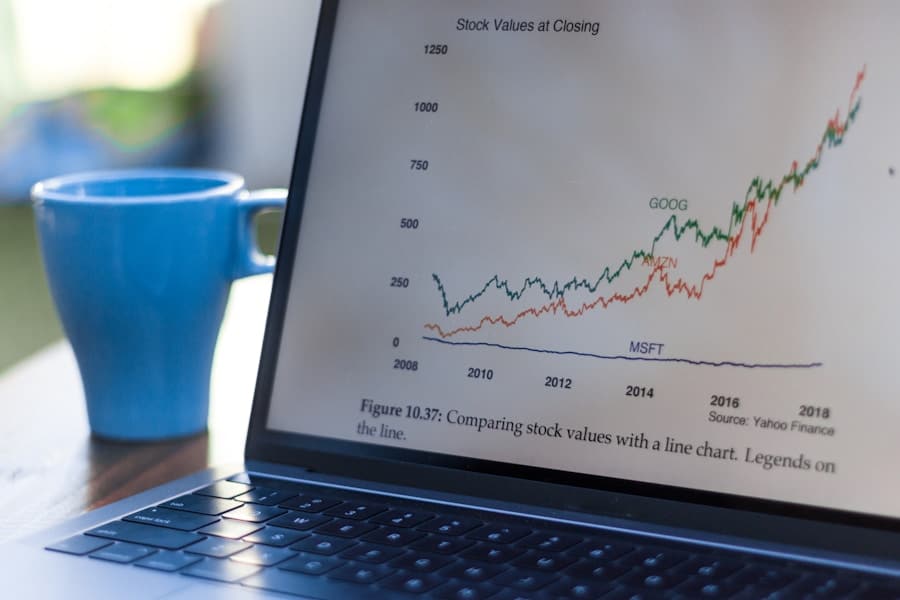The intersection of artificial intelligence (AI) and stock market prediction has emerged as a focal point of interest for investors, analysts, and technologists alike. As financial markets become increasingly complex and data-driven, the need for sophisticated analytical tools has never been more pressing. AI, with its ability to process vast amounts of data and identify patterns that may elude human analysts, offers a promising avenue for enhancing stock market predictions.
The integration of AI into financial forecasting is not merely a trend; it represents a paradigm shift in how market dynamics are understood and navigated. Historically, stock market predictions relied heavily on fundamental analysis, which examines a company’s financial health, and technical analysis, which focuses on price movements and trading volumes. However, the advent of AI has introduced a new dimension to this field.
Machine learning algorithms can analyze historical data, news articles, social media sentiment, and even macroeconomic indicators to generate insights that are more nuanced and timely than traditional methods. This evolution raises important questions about the reliability of AI-generated predictions and the implications for investors who increasingly depend on these technologies to inform their trading strategies.
Key Takeaways
- AI has revolutionized stock market prediction by using advanced algorithms to analyze data and make predictions.
- Machine learning plays a crucial role in stock market analysis by identifying patterns and trends in large datasets.
- Data sources for AI stock market prediction include financial statements, market news, social media, and economic indicators.
- Advantages of AI in stock market prediction include speed, efficiency, and the ability to process large amounts of data. Limitations include the potential for overfitting and the inability to account for unexpected events.
- Case studies have shown successful AI stock market predictions, such as predicting market movements based on sentiment analysis of news articles.
- Ethical and regulatory considerations in AI stock market prediction include the potential for market manipulation and the need for transparency in AI algorithms.
- The future of AI in stock market prediction is promising, with advancements in deep learning and natural language processing.
- Tips for investors using AI-generated stock market predictions include understanding the limitations of AI, diversifying investments, and staying informed about market trends.
The Role of Machine Learning in Stock Market Analysis
Machine learning, a subset of AI, plays a pivotal role in stock market analysis by enabling systems to learn from data without being explicitly programmed. This capability is particularly valuable in the context of financial markets, where the sheer volume of data can be overwhelming. Machine learning algorithms can identify correlations and trends that may not be immediately apparent to human analysts.
For instance, supervised learning techniques can be employed to train models on historical stock price data, allowing them to predict future price movements based on identified patterns. One notable application of machine learning in stock market analysis is the use of neural networks. These algorithms mimic the human brain’s interconnected neuron structure, allowing them to process complex datasets with multiple variables.
For example, a neural network might analyze historical stock prices alongside economic indicators such as interest rates and unemployment figures to forecast future price movements. Additionally, unsupervised learning techniques can cluster stocks based on similar performance characteristics, helping investors identify potential investment opportunities or risks that may not be visible through traditional analysis.
Data Sources and Variables Used in AI Stock Market Prediction

The effectiveness of AI in stock market prediction is largely contingent upon the quality and diversity of the data it utilizes. A wide array of data sources can be leveraged to enhance predictive accuracy. Traditional financial data such as stock prices, trading volumes, and earnings reports remain foundational.
However, the incorporation of alternative data sources has gained traction in recent years. For instance, social media sentiment analysis can provide insights into public perception and investor sentiment regarding specific stocks or market trends. Moreover, macroeconomic indicators play a crucial role in shaping market dynamics.
Variables such as GDP growth rates, inflation rates, and employment statistics can significantly influence stock performance. By integrating these diverse data sources—ranging from structured financial data to unstructured text from news articles—AI models can develop a more comprehensive understanding of the factors driving market movements. This multifaceted approach allows for more robust predictions that account for both quantitative metrics and qualitative insights.
Advantages and Limitations of AI in Stock Market Prediction
The advantages of employing AI in stock market prediction are manifold. One of the most significant benefits is the ability to process vast amounts of data at unprecedented speeds. Traditional analysis methods often struggle to keep pace with the rapid influx of information in today’s markets.
AI systems can analyze real-time data feeds, enabling investors to make informed decisions based on the latest developments. Furthermore, machine learning algorithms can continuously improve their predictive capabilities by learning from new data, thereby adapting to changing market conditions. However, despite its advantages, AI in stock market prediction is not without limitations.
One major concern is the potential for overfitting, where a model becomes too tailored to historical data and fails to generalize effectively to new situations.
Additionally, the reliance on historical data raises questions about the model’s ability to account for unprecedented events or black swan occurrences—rare but impactful events that can disrupt markets significantly.
Investors must remain cautious and recognize that while AI can enhance predictive accuracy, it is not infallible.
Case Studies of Successful AI Stock Market Predictions
Several case studies illustrate the successful application of AI in stock market predictions, showcasing its potential to generate substantial returns for investors. One prominent example is the use of deep learning algorithms by hedge funds such as Renaissance Technologies.
Their models have reportedly achieved annualized returns exceeding 30%, demonstrating the efficacy of AI-driven strategies in navigating complex market environments. Another noteworthy case involves the use of natural language processing (NLP) to analyze news sentiment related to specific stocks. A study conducted by researchers at MIT found that an NLP model trained on news articles could predict stock price movements with remarkable accuracy.
By quantifying sentiment scores from news headlines and correlating them with stock performance, the researchers were able to develop a predictive model that outperformed traditional benchmarks. This case underscores the potential for AI to leverage unstructured data sources in generating actionable insights for investors.
Ethical and Regulatory Considerations in AI Stock Market Prediction

As AI continues to permeate the realm of stock market prediction, ethical and regulatory considerations become increasingly pertinent. One major concern revolves around market manipulation and fairness. The deployment of AI algorithms by institutional investors could create an uneven playing field, where those with access to advanced technologies gain an unfair advantage over retail investors.
This raises questions about the ethical implications of using AI-driven strategies that may exacerbate existing inequalities within financial markets. Regulatory bodies are also grappling with how to oversee the use of AI in trading practices effectively. The rapid evolution of technology often outpaces regulatory frameworks, leading to potential gaps in oversight.
For instance, algorithms that execute trades at high speeds could inadvertently contribute to market volatility or flash crashes if not properly monitored. Regulators must strike a balance between fostering innovation in financial technology while ensuring that markets remain fair and transparent for all participants.
The Future of AI in Stock Market Prediction
Looking ahead, the future of AI in stock market prediction appears promising yet complex. As advancements in machine learning continue to unfold, we can expect even more sophisticated models capable of analyzing an ever-expanding array of data sources. The integration of real-time data analytics with predictive modeling will likely enhance decision-making processes for investors across various sectors.
Furthermore, as computational power increases and costs decrease, access to advanced AI tools will become more democratized, allowing smaller investors to leverage these technologies. However, challenges remain on the horizon. The need for transparency in AI algorithms is paramount; investors must understand how predictions are generated and what factors influence them.
Additionally, as AI systems become more autonomous, concerns about accountability arise—who is responsible when an algorithm makes a poor investment decision? Addressing these questions will be crucial as we navigate the evolving landscape of AI-driven stock market prediction.
Tips for Investors Using AI-Generated Stock Market Predictions
For investors looking to harness the power of AI-generated stock market predictions effectively, several strategies can enhance their approach. First and foremost, it is essential to maintain a critical mindset when interpreting predictions generated by AI models. While these tools can provide valuable insights, they should not be viewed as infallible forecasts but rather as one component of a broader investment strategy.
Investors should also consider diversifying their sources of information by combining AI-generated predictions with traditional analysis methods. This hybrid approach allows for a more comprehensive understanding of market dynamics and reduces reliance on any single predictive model. Additionally, staying informed about advancements in AI technology can help investors adapt their strategies as new tools and methodologies emerge.
Finally, it is crucial for investors to remain aware of their risk tolerance and investment goals when utilizing AI-generated predictions. While these tools can enhance decision-making processes, they should complement rather than dictate investment strategies. By maintaining a balanced perspective and leveraging AI as part of a well-rounded approach, investors can navigate the complexities of the stock market with greater confidence and insight.
If you are interested in the latest technological advancements, you may also want to check out this article on the Samsung Galaxy Chromebook. This innovative device offers a new world of possibilities for users looking to enhance their productivity and creativity. With its sleek design and powerful features, the Samsung Galaxy Chromebook is a must-have for tech enthusiasts.
FAQs
What is AI in the context of stock market prediction?
AI, or artificial intelligence, refers to the use of computer algorithms and models to analyze large amounts of data and make predictions about future stock market trends. This can include machine learning, natural language processing, and other advanced techniques.
How does AI predict stock market trends with high accuracy?
AI uses historical stock market data, news articles, social media sentiment, and other relevant information to identify patterns and make predictions about future stock market movements. By analyzing large amounts of data and identifying complex relationships, AI can make predictions with high accuracy.
What are the benefits of using AI for stock market prediction?
Using AI for stock market prediction can provide several benefits, including increased accuracy in predicting market trends, the ability to analyze large amounts of data quickly, and the potential to identify patterns and trends that may not be apparent to human analysts.
What are the limitations of AI in predicting stock market trends?
While AI can provide high accuracy in predicting stock market trends, there are limitations to its effectiveness. These limitations can include the potential for overfitting models to historical data, the inability to account for unexpected events or market shocks, and the reliance on the quality and quantity of data available.
How is AI being used in the stock market industry?
AI is being used in the stock market industry in various ways, including algorithmic trading, sentiment analysis of news and social media, risk management, and portfolio optimization. Additionally, AI is being used to develop trading strategies and to automate certain aspects of the trading process.

